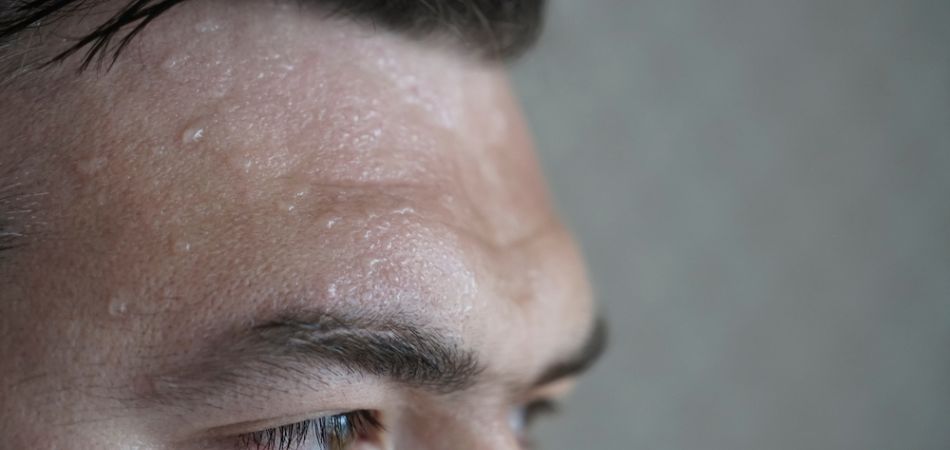Alcohol Sweats
Alcohol’s effects lead people to unfamiliar and sometimes unsettling side effects. One such effect can be heavy, persistent sweating, and this sign may be more dangerous than we first give it credit for.
We explore the connection between alcohol use and sweating, highlighting times when perspiration can be an alarming indicator of a deeper issue. We’ll show you that support is available if sweats become part of a wider struggle with alcohol addiction.

What do we mean by “alcohol sweats”?
Alcohol sweats are a general description of episodes of unexpected or excessive perspiration linked to a person’s drinking. A person can experience alcohol-related sweating in different ways, from feelings of clamminess on a hangover to unsettling hyperhidrosis during alcohol withdrawal.
Sweating itself is, of course, a normal function of our body. It’s our way of cooling down and maintaining a stable internal temperature. It also helps act as a natural antimicrobial defence and can help eliminate some toxins and heavy metals from your body. It’s an incredibly important function of the autonomic nervous system (ANS).
For most, alcohol sweats are a short-lived side effect after a heavy night of drinking. For others, it may be a signal that alcohol is gaining a dangerous level of control in the body. Understanding when sweating is harmless and when it indicates a deeper issue can be your first step in determining whether to shrug it off or take preventive action.
What are the main causes of alcohol sweats?
The main causes of alcohol sweats include:
The body’s thermoregulation and alcohol
One of alcohol’s most immediate effects is widening your blood vessels (vasodilation), making more blood flow to your skin. This is why we sometimes feel warmer or blush while drinking. The body here can be tricked into thinking it needs to cool down. Sweating is the natural response, often lasting into our sleep after heading home from a night out. This type of sweating is not particularly dangerous, but it does put some strain on the circulatory system. Over time, prolonged blood vessel dilation may contribute to longer-term health issues like high blood pressure.
The role of your nervous system
Alcohol’s impairments on your nervous system are well known, with research showing that up to three-quarters of all chronic alcohol abusers suffer from autonomic dysfunction. A person’s dependency on alcohol will destabilise the nervous system over time, making sudden sweats more common. In some cases, these changes may overlap with anxiety and restlessness, intensifying perspiration even further.
Alcohol metabolism
Metabolism is the set of all chemical processes in the body that convert food and drink into energy. As alcohol enters the system, your liver works to break it down. Most happens through enzymes, but around 2-5% is expelled directly through breath, urine and sweat. This is why alcohol is detectable on breathalysers and on the skin’s surface.
Are there different types of alcohol sweats?
Alcohol-related sweating can be observed in different ways. Understanding when it appears might help you understand if it’s a passing side effect or something that needs more attention.
- Sweating while drinking: As blood vessels widen and skin temperature increases, some people experience facial flushing and sweating as they drink. If it’s happening frequently, it may indicate alcohol intolerance or increasing pressure on the liver.
- Night sweats after drinking: Many people have experienced waking up drenched after a session of heavy drinking. A one-off night sweat may be more innocuous, but repeated episodes may be linked to dependency or grave, underlying health issues.
- Sweating during alcohol withdrawal: For those in recovery, sweating is one of the most common alcohol withdrawal symptoms. Alcohol sweats in withdrawal are often paired with waves of anxiety or tremors. In severe cases, paroxysmal or sudden sweating can be an early warning sign of delirium tremens, which needs immediate medical support.

When should I consider alcohol sweats as a sign of danger?
There are times when sweating signals a more serious issue, which you should take seriously:
During alcohol withdrawal
If you’ve decided to give up alcohol after prolonged addiction, sweating will be one of the most common withdrawal symptoms. If you’re waking drenched in sweat alongside shaking hands or insomnia, you may be facing alcohol withdrawal syndrome (AWS).
Excessive perspiration during withdrawal is linked with a long list of symptoms, including confusion, hallucinations and seizures. As some of these conditions can become life-threatening, heavy sweats linked with withdrawal should become a reason to seek professional help before symptoms worsen.
Signs of underlying health conditions
Sometimes alcohol sweats overlap with other medical problems. Disorders of the thyroid, hormonal changes, infections, or heart issues can all cause unexplained sweating. If perspiration comes with chest pain, fever, shortness of breath, or sudden disorientation, you may be facing something greater than just alcohol’s effects. These signs should never be ignored; immediate medical attention is essential.
An indicator of addiction
Persistent night sweats after drinking can be one of the quieter signs that alcohol use is slipping into dependence. If your sweating regularly coincides with alcohol cravings or drinking in secrecy, this may be reflecting more than just physical side effects. Sweating may be considered one part of a wider pattern of alcohol addiction, and acknowledging it as such may be an important step towards getting the treatment you need.
What can I do about alcohol sweats?
Alcohol sweats will mostly be uncomfortable but manageable. Here are some practical steps to help you mitigate alcohol sweats in the short term:
Short-term steps:
- Stay hydrated with water/electrolytes: Replace lost fluids by drinking water steadily throughout the day. Electrolyte-rich drinks may help restore balance, especially after a heavy night, and can prevent dehydration from worsening sweating.
- Wear breathable fabrics, change bedding: Short-term quality of life changes can make heavy sweats more tolerable. Research even shows us that, for those in withdrawal, the body can experience increased sensitivity to sensory stimulation and touch. Loose, breathable clothing and fresh bedding reduce overheating. Keeping spare clothes or sheets nearby makes it easier to stay comfortable if you wake in sweats.
- Keep the room cool and ventilated: Use fans or keep windows open to help you regulate temperature. A cooler sleeping environment will ease night sweats and increase sleep quality.
Long-term considerations:
- Document sweating episodes: Keep a diary to track when sweats happen to help you identify patterns between drinking and perspiration. This may also give a medical professional a clearer picture of your symptoms.
- Seek GP advice to rule out underlying health issues: A doctor or GP can test whether other complications are contributing to your perspiration, including any medications you’re taking.
- Explore professional addiction support: If alcohol sweats are becoming more frequent and are accompanied by other warning signs of dependency, specialist treatment may become a life-saving process, helping you manage symptoms as well as the root cause of addiction.
Where can I turn for help with alcohol addiction?
Alcohol sweats may only be uncomfortable, but other symptoms of alcohol addiction can become life-threatening before you realise it.
At Providence Projects, we specialise in treatment for alcohol addiction with medical detox, helping you manage withdrawal symptoms. We incorporate evidence-based therapies to help you address the deep, underlying drivers, and aftercare systems are in place to keep you on track for permanent sobriety.
Our admissions team is ready to help you with a caring, confidential phone call. Reach out today and let this be the moment you begin moving towards a brighter future, free from addiction’s grasp.
Reach out to our expert support team 24 hours a day

Looking for rehab?
If you are looking for rehab to take your, or a loved ones, life back from addiction, look no further than Providence Projects. Reach out to us today to find out how we can help you or a loved one achieve long-term recovery.
(Click here to see works cited)
- Admin. “Alcohol and Hyperhidrosis: Dealing with Alcohol Sweats.” The Center for Hyperhidrosis – Center for Hyperhidrosis CUMC, 10 June 2025, www.hyperhidrosiscumc.com/alcohol-and-hyperhidrosis-dealing-with-alcohol-sweats/.
- “How Alcohol Affects Your Body.” WebMD, WebMD, www.webmd.com/mental-health/addiction/ss/slideshow-alcohol-body-effects
- Julian TH, Syeed R, Glascow N, Zis P. Alcohol-induced autonomic dysfunction: a systematic review. Clin Auton Res. 2020 Feb;30(1):29-41. doi: 10.1007/s10286-019-00618-8. Epub 2019 Jun 20. PMID: 31222483; PMCID: PMC6987055.
- Paton A. Alcohol in the body. BMJ. 2005 Jan 8;330(7482):85-7. doi: 10.1136/bmj.330.7482.85. PMID: 15637372; PMCID: PMC543875.
- Kaye AD, Staser AN, Mccollins TS, Zheng J, Berry FA, Burroughs CR, Heisler M, Mouhaffel A, Ahmadzadeh S, Kaye AM, Shekoohi S, Varrassi G. Delirium Tremens: A Review of Clinical Studies. Cureus. 2024 Apr 4;16(4):e57601. doi: 10.7759/cureus.57601. PMID: 38707114; PMCID: PMC11069634.
- Canver BR, Newman RK, Gomez AE. Alcohol Withdrawal Syndrome. [Updated 2024 Feb 14]. In: StatPearls [Internet]. Treasure Island (FL): StatPearls Publishing; 2025 Jan-. Available from: https://www.ncbi.nlm.nih.gov/books/NBK441882/
- Increased Pain Sensitivity in Alcohol Withdrawal Syndrome – Jochum – 2010 – European Journal of Pain – Wiley Online Library, onlinelibrary.wiley.com/doi/abs/10.1016/j.ejpain.2009.11.008